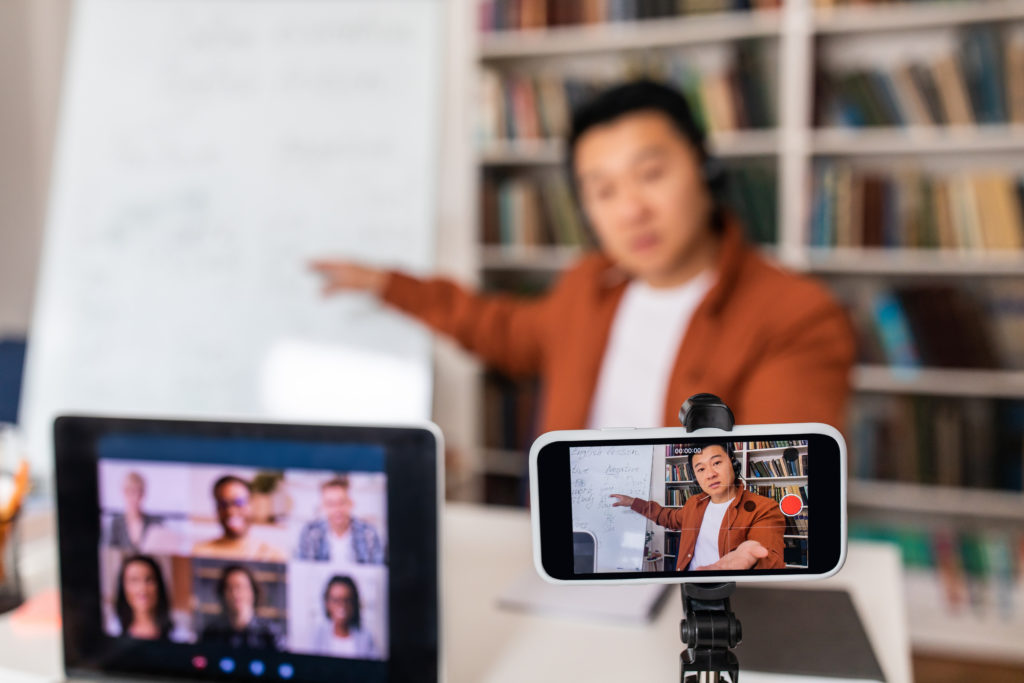Quick Hits
Daily brief research updates from the cognitive sciences

Not so long ago all learning went online – out of necessity.
There has been plenty pf research into differences in online learning and in-person learning but this study by Gellisch et al. at Ruhr-University Bochum looked at different physiological stress responses between online learning and in-person learning.
This study was interesting because it studied the same 82 students in an in-person and online learning scenario. They were attending a blended learning anatomy course that had different groups alternating between online lessons and in-person lessons (the same lessons).
The participants were monitored with heart rate sensors and also cortisol, the stress hormones, was measured by taking saliva samples at the start of the session after 60 minutes and at the end of the two-hour lesson.
What did they find?
They found that the in-person lesson stimulated higher cortisol levels, higher heart rate and lower heart rate variability. This is consistent with a stress response. So, is in-person learning more stressful? Yes, but and this is a big but, this also shows higher stimulation and higher stimulation is generally associated with better memory function and learning,
So, in short online learning is less stressful, more comfortable, but likely less impactful. This not to mention other positive benefits of in-person learning such as bonding with classmates and additional learning opportunities through casual and focused conversations around the course.
What’s more those in the in-person groups reported higher enjoyment of the very same class. So, let’s not write off in-person courses, yet!

Andy Habermacher
Andy is author of leading brains Review, Neuroleadership, and multiple other books. He has been intensively involved in writing and research into neuroleadership and is considered one of Europe’s leading experts. He is also a well-known public speaker, speaking on the brain and human behaviour.
Andy is also a masters athlete (middle distance running) and competes regularly at international competitions (and holds a few national records in his age category).
Reference
Sizhen Su, Le Shi, Yongbo Zheng, Yankun Sun, Xiaolin Huang, Anyi Zhang, Jianyu Que, Xinyu Sun, Jie Shi, Yanping Bao, Jiahui Deng, Lin Lu.
Leisure Activities and the Risk of Dementia: A Systematic Review and Meta-Analysis.
Neurology, 2022; 10.1212/WNL.0000000000200929
DOI: 10.1212/WNL.0000000000200929
More Quick Hits
Brain Scans Can Predict Your Political Affiliation
Quick HitsDaily brief research updates from the cognitive sciences rain scanning of political partisans is not new and it has long been reported that brain scans can predict political affiliation. But those studies were scans of political partisans...
Children with Same-Sex Parents Are Socially Well-Adjusted
Quick HitDaily brief research updates from the cognitive sciences his is not the first study to report that children of same-sex parents are well adjusted, there are plenty, but it is one of the first to be representative and hence gives some...
Simple Exposure to New Things Makes Your Brain Ready to Learn
ouldn’t it be great if we could learn things with no effort? Well, actually we often do, and children learn vast quantities of information, and knowledge with little to no effort – think of how well we learn languages which become fiendishly...
So, Can Cranberries Improve Memory?
tend to be hesitant to report on studies of single foods doing amazing things (because many do), but this piece of research still caught my eye. So, what did this group of researchers from the University of East Anglia find? Well, they...
The Real Problem with Social Media: It Induces Dissociative States
Quick HitsDaily brief research updates from the cognitive sciences ocial media seems to hijack our brains – or at least according to popular narratives. Most of us have experienced this where you get stuck in an endless stream of content,...
Adventurous Play Boosts Mental Resilience in Kids
o, a simple cheap way to help your kids improve all life skills and strengthen mental wellbeing. Too good to be true? Well, this piece of research, just out, finds a fascinating correlation with mental health and kids. This correlation was...






